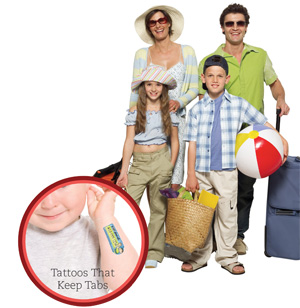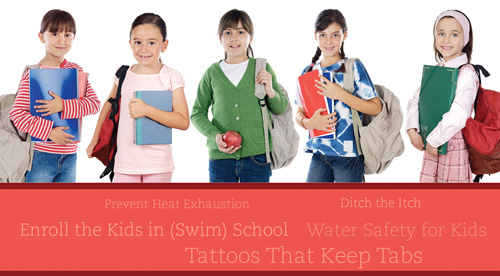Summer Safety Tips
For many people, summer means fun in the sun. The kids are out of school, adults are on vacation and it’s time for outdoor activities. From keeping your kids hydrated to teaching them not to play in cars, here are tips and tricks for avoiding the summer dangers your kids may find in outdoor play
 Prevent Heat Exhaustion
Prevent Heat Exhaustion
Symptoms of heat exhaustion include nausea, vomiting, dizziness, and confusion. If you suspect your child may be suffering from it, the AAP recommends you have him stop all physical activity, lie down in a cool place, and drink fluids. Seek medical care if the symptoms don’t stop quickly or your child’s body temperature is 103°F or higher.
Drink Up
Dehydration can occur in kids who are extremely active. During exercise, depending on their size and weight, kids are encourages to drink between four and ten ounces of fluid every 15 to 20. For junior jocks exercising more than 45 minutes, sports drink (not an energy drink) with 6 to 8 percent carbohydrates and electrolytes will help maintain balanced energy levels.
Ditch the Itch
If your kid’s been exposed to poison ivy, poison oak, or poison sumac, here’s how to make him more comfortable: Wash the area with soap and water for at least ten minutes; apply an over-the-counter 1% hydrocortisone cream; and keep scratching damage to a minimum by trimming his fingernails. For persistent itching, use calamine lotion three to four times a day. Call a doctor if the rash is on your child’s face or if these treatments don’t work.
Water Safety for Kids
Keep your kids safe at the swimming pool, beach, and more by being prepared and having the proper gear. Learn about heat exhaustion, bug bites, and more summer safety tips you need to know.
Keep It Dry
Because young kids are both curious and top-heavy, make sure there’s nothing in your yard that can accumulate water and they can fall into; little ones can drown in just one inch. Empty kiddie pools, buckets, or any containers and store indoors, and upside down, after each use.
Backyard Pool Alert
Prevent a tragedy by installing a four-foot-high fence (that can’t be climbed) with a self-closing and self-latching gate (latches should be out of kids’ reach). Pump shut-off devices and anti-entrapment drain covers are a must, and a pool alarm is a good idea, too.
Enroll the Kids in (Swim) School
Recent studies suggest that children as young as 1 may be less likely to drown after taking swim classes. Of course, not every kid will be ready to swim at this age, so it is recommended that parents consider their child’s physical development, emotional readiness, and frequency of exposure to water (outside of the bath) before signing up.
Be Your Own Lifeguard
If you’re taking your kids to the pool, lake, or beach, you’re automatically on duty. Going in a group? Assign each parent a 20-minute time slot to keep watch, recommends Apply. If you’re the only adult, keep your eyes on the kids at all times, and consider it off-limits to read a book or magazine—even if there’s a lifeguard on duty. For more peace of mind, take a class to get certified in first aid and CPR. Certification usually takes just one afternoon.
Get the Right Life Jacket
Life jackets are a must on boats, as well as near water for young children who lack swimming skills. Water wings and blow-up tubes don’t provide enough protection and won’t keep your kid upright. Select a suitable life jacket and make sure it fits your child properly.
Tattoos That Keep Tabs
Beaches, water parks, and pools can get pretty crowded, making it easy for kids to get lost. Dress yours in distinctive patterns so you can spot them. For kids who aren’t old enough to know their phone number, use a temporary tattoo that’s placed on a child’s hand or arm and displays your phone number.
Kids in Hot Cars
To keep your kids safe:
- don’t leave them in a car, which can quickly heat up, especially on a hot, sunny day always lock your car and secure the keys so that your kids can’t get to them
- warn your kids about playing in the car by themselves without adult supervision
- install a trunk release mechanism, so that they can’t get trapped in the trunk
- get your kids out of the car first, and then worry about getting the groceries, etc., out of the car when you get home
- Make sure that child care providers and day care workers have a plan to make sure that kids aren’t left in the day care providers’ car or van.
- If you are afraid that you might leave your sleeping infant or toddler in their car seat when you get out of the car, place a reminder on the dashboard.
Also be on alert for cars that might have an unattended child left inside. If you see a child alone in a car, be sure to call for help and make sure the child gets out as soon as possible.
And when a child is missing, in addition to checking the backyard pool and any other bodies of water be sure to check inside the car and trunk of any nearby vehicles.
Kids in Cool Cars
The danger of being left alone isn’t limited to kids getting overheated. Simply leaving the car running and the air conditioning on doesn’t make your child any safer, even if it is just for a few minutes. Your child might be abducted, put the car into drive, or even get caught in a closing power window. So use the drive-through if it is available or take your kids inside, even if you will just be a few minutes. Don’t leave your kids alone in the car. It just isn’t safe and it is actually against the law.

Summer – it’s time for outdoor activities like riding bikes and hosting barbecues.
- One of the best ways to stay safe this summer is to wear a helmet and other safety gear when biking, skating and skateboarding, and when riding scooters, all-terrain vehicles, and horses. Studies on bicycle helmets have shown they can reduce the risk of head injury by as much as 85 percent.
- Use layers of protection to prevent a swimming pool tragedy. This includes placing barriers completely around your pool to prevent access, using door and pool alarms, closely supervising your child and being prepared in case of an emergency.
- Never bring charcoal grills indoors. Burning charcoal produces deadly carbon monoxide.
- When cooking outdoors with a gas grill, check the air tubes that lead into the burner for any blockage from insects, spiders, or food grease. Check grill hoses for cracking, brittleness, holes, and leaks. Make sure there are no sharp bends in the hose or tubing. If you ever detect a leak, immediately turn off the gas at the tank and don’t attempt to light the grill until the leak is fixed. Newer grills and propane tanks have improved safety devices to prevent gas leaks.
- Make sure your home playground is safe. 60 percent of playground injuries are caused because of falls, so having a safe surface is critical.
- If you are a soccer mom or dad, beware that movable soccer goals can fall over and kill children. Make sure the goal is anchored securely at all times and never allow anyone to climb on the net or goal framework or hang from the cross bar. Remove nets when the goals are not in use.
- Don’t allow a game of hide-n-seek to become deadly. Many reports have come of numerous suffocation deaths involving children who crawled inside old cedar chests, latch-type freezers and refrigerators, iceboxes in campers, clothes dryers and picnic coolers. Childproof old appliances, warn children not to play inside them.
- Install window guards to prevent children from falling out of open windows. Guards should be installed in children’s bedrooms, parents’ bedrooms, and other rooms where young children spend time. Or, install window stops that permit windows to open no more than 4 inches. Whenever possible, open windows from the top – not the bottom. Also, keep furniture away from windows to discourage children from climbing near windows.


